The 8 Best Grain Mills for Homebrewing [2022]
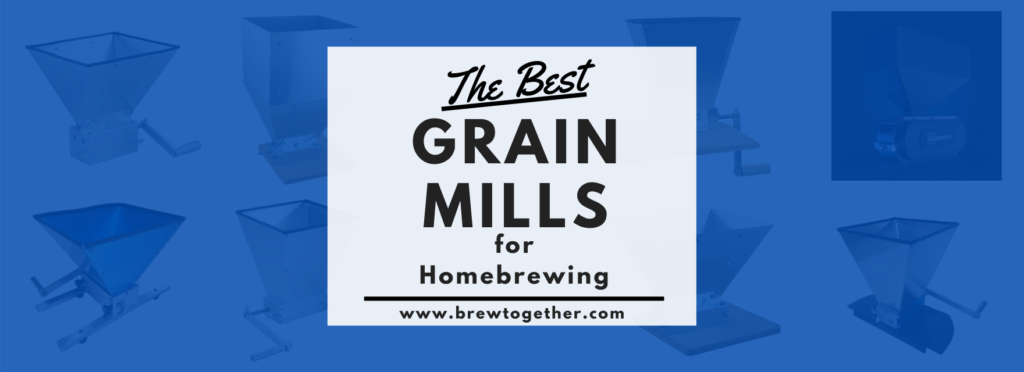

As you continue to brew more often and more complex beers, you’ll find that you need to add more and more equipment to your homebrewing arsenal. While you can usually purchase your grains pre-milled by your local homebrew supply shop or an online homebrew supply store like MoreBeer, a grain mill is a solid investment for an advanced homebrewer who wants more control over their grain bills, grain crush, and brewing schedule.
Already convinced you should get one? Skip down to Section 3: The Best Grain Mills for Homebrewing for an overview of the best grain mills for homebrewing and a quick comparison of their pricing and features. If you’re still not sure about why you’d want to own a grain mill, here’s why we think it’s a worthwhile investment:
Why Own a Grain Mill
More Control
First, having your own grain mill will give you more control over the crush of your grain, which you can adjust to increase your overall brewing efficiency. Most homebrew supply stores and online retailers crush all of their grain at the same gap, which doesn’t account for your specific brewing style and system.
The ability to adjust your roller gap will let you crush your grain finer if you Brew in a Bag (BIAB), or coarser for your traditional Hot Liquor Tank/Mash Tun system or Electric All-In-One system (by the way, here’s a list of our favorite ones!). You can also crush your grains separately to adjust your gap for each specific grain, ensuring that you are getting the most out of all of your ingredients.
Bulk Discounts
Second, owning your own grain mill allows you to take advantage of bulk discounts on your base malts or most used specialty malts, which reduces the overall cost of your homebrew. Most base malts are much cheaper to purchase unmilled in bulk than milled or in smaller quantities (we have a tip for those looking for the best price for grain online here!). Additionally, if you have a few house recipes that you brew over and over again, you can buy those ingredients in bulk and always be ready for brew day.
Grain on Hand
Finally, owning your own mill also lets you store uncrushed malt, which has a much longer shelf life than crushed malt. Keeping your malt on hand gives you the option to brew on a whim if the time suddenly becomes available. This saves you a trip to your local homebrew supply shop, or if you don’t have one nearby, saves you about a week in turnaround time ordering your ingredients online. There’s nothing worse than suddenly having a free day to brew and not being able to because you don’t have the ingredients you need!
How to Choose a Grain Mill
Budget
The first thing to consider when choosing a grain mill is your budget, because there is a huge range of cost. Grain mills for homebrewers range anywhere from under $100 to about $800, so there is an option for almost any budget. While overall quality doesn’t always correlate with price, consider how often you will be using the mill to determine how sturdy of a mill you really need. The cost of replacing a cheap mill every year or two adds up, so make sure you get one that is up for what you’re going to throw at it!
Differences in the Rollers
The most important part of the grain mill are the rollers that pull the grain between them and crush them, opening the husk and exposing the inner kernels. High-quality mills are able to crush the grain without grinding it into a powder, which helps avoid stuck mashes and stuck sparges.
Roller Size
Larger rollers provide a better crush because the larger the rollers are, the less severe the entry angle is between them. In general, most homebrew-level grain mills have similarly sized rollers and small size differences don’t have a huge impact on crush quality, it’s a worthwhile consideration when choosing your ideal grain mill.
Roller Type
Most grain mill rollers are knurled rather than fluted because knurling is a much cheaper manufacturing process. While knurled rollers are excellent at pulling the grain into the mill, they cause more tearing on the grain than is ideal. Smoother, fluted rollers cause less tearing, but are more expensive to manufacture and struggle to effectively pull the grain between them unless the rollers are much larger. Not many homebrew-level mills have fluted rollers, but a few of the most expensive ones, like the SSBrewtech Grain Mill, feature large fluted rollers.
Number of Rollers
One of the biggest differences between the various available grain mills is the number of rollers. Most homebrewing-level grain mills have either two or three rollers. Most three roller mills first pull the grain through a fixed-width gap that helps to separate the hull in tact before pulling the grain through the adjustable gap to crush it. This helps keep a good bed of hulls in your grist which filters the mash and helps avoid stuck mashes and stuck sparges.
There are pros and cons to two and three roller mills that are worth considering. The image below shows an overview, and you can click here to learn more about the pros and cons of two vs three roller grain mills for homebrewing.
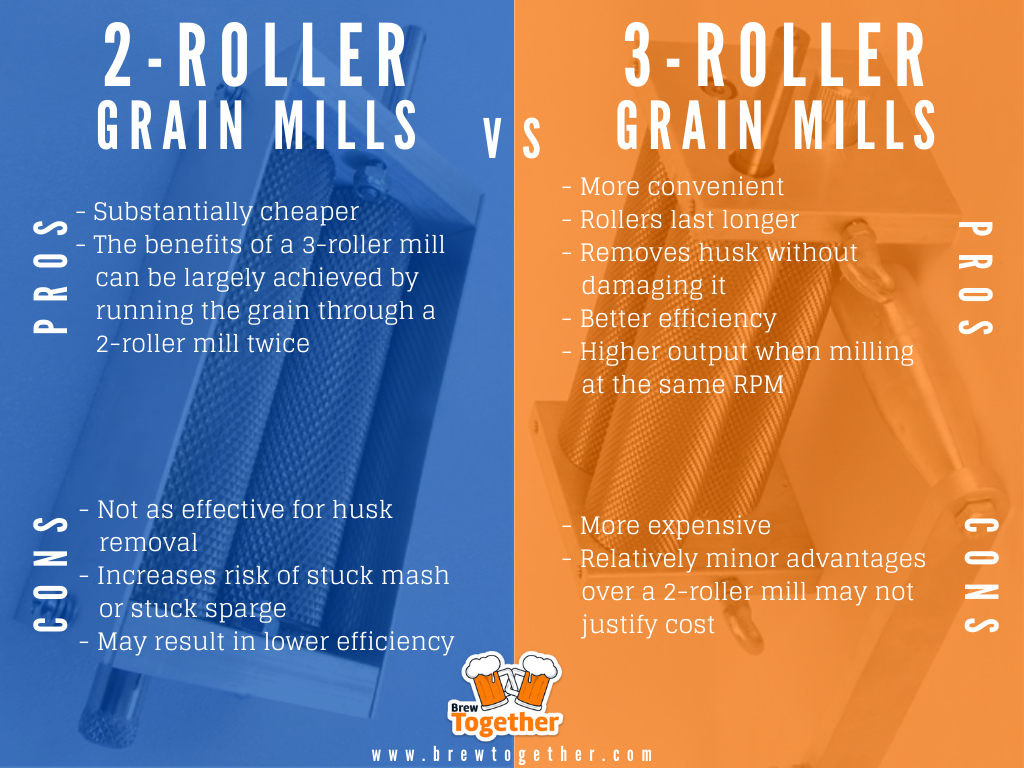

Powered vs. Free-Spinning
Mill rollers can either be gear driven or free-spinning, which is sometimes referred to as “grain driven”. In general, the more rollers in the mill, the better and more uniform the crush will be, however two rollers is often sufficient at the average homebrew level where small variation in crush uniformity and brewing efficiency are less critical.
Two gear powered rollers is better than having one gear powered roller and one free-spinning roller. Two gear-driven rollers will both spin towards each other even without grain in the mill, while mills with a “grain driven” or free spinning mill will only have one spinning roller when no grain is present. The primary advantage of having two or more gear driven rollers is that the rollers will exert equal force on the grain which provides a more uniform crush. Mills with only a single gear driven roller are much cheaper, but if you can afford a mill with two or three gear powered rollers will provide a more precise and consistent crush.
Roller Material
The material that the rollers are made from is an important difference. Most are now made with stainless steel rollers, but some are made from harder grades of steel than others. Choosing a sufficiently hard roller material increases the longevity of your mill. Another advantage of stainless steel rollers is that it helps prevent rust from forming on and around the rollers. With any mill, we still recommend keeping it clean and dry when stored.
Roller Adjustability
Finally, there is some variation in the adjustability of the rollers between the different grain mills available. Remember, no one gap size is perfect for all grains or all brewing systems. Some mills are much easier to adjust than others, and some allow for a greater range of adjustment. If you brew with a lot of different grains or think you will need to change your gap size often, ensure that you choose a mill that is easy to adjust and allows for the range in gap size that you will need.
Electric vs. Manual/Drill-Driven
The biggest factor that affects the price differences in grain mills is whether they are driven by an electric motor or come with a hand crank. Hand cranking grain is very time consuming and tedious, and because you can’t maintain a uniform rotation speed, you will get a less consistent crush. Manual mills sold with a crank are usually able to be run with a low-speed drill. which is an inexpensive solution for an electric mill when compared to the price of an electric one. If you don’t mind the additional work of running your mill with a drill, then choosing a manual model is a much cheaper option.
Capacity/Crush Rate
One other factor to consider when choosing a grain mill is the hopper capacity and crush rate. This isn’t a huge issue for most brewers making 5-gallon batches of average gravity beers, but if you make larger batches, you’ll want to consider a mill that can handle it quickly and efficiently.
The Best Grain Mills for Homebrewing
Convinced that it’s time to invest in a grain mill? Great! Here’s some of the most popular ones across the different price points, as well as the specifications for each according to the selection criteria we discussed above. Below the chart is a detailed description of each as well. We don’t recommend one of these as the “best” grain mill, because they vary so much across price and application that there is no one mill that is best for everyone.
Affiliate Disclosure: BrewTogether is also a participant in an affiliate program with MoreBeer and Adventures in Homebrewing, our favorite online homebrewing equipment/ingredients retailers. Some of the links in this article are affiliate links, which means that if you choose to make a purchase after clicking the link, I will earn a small commission at no additional cost to you. We recommend these companies because we have had great experiences with both, and would recommend them even without the small commissions we earn. Please feel free to reach out anytime with questions. Thank you for your support!
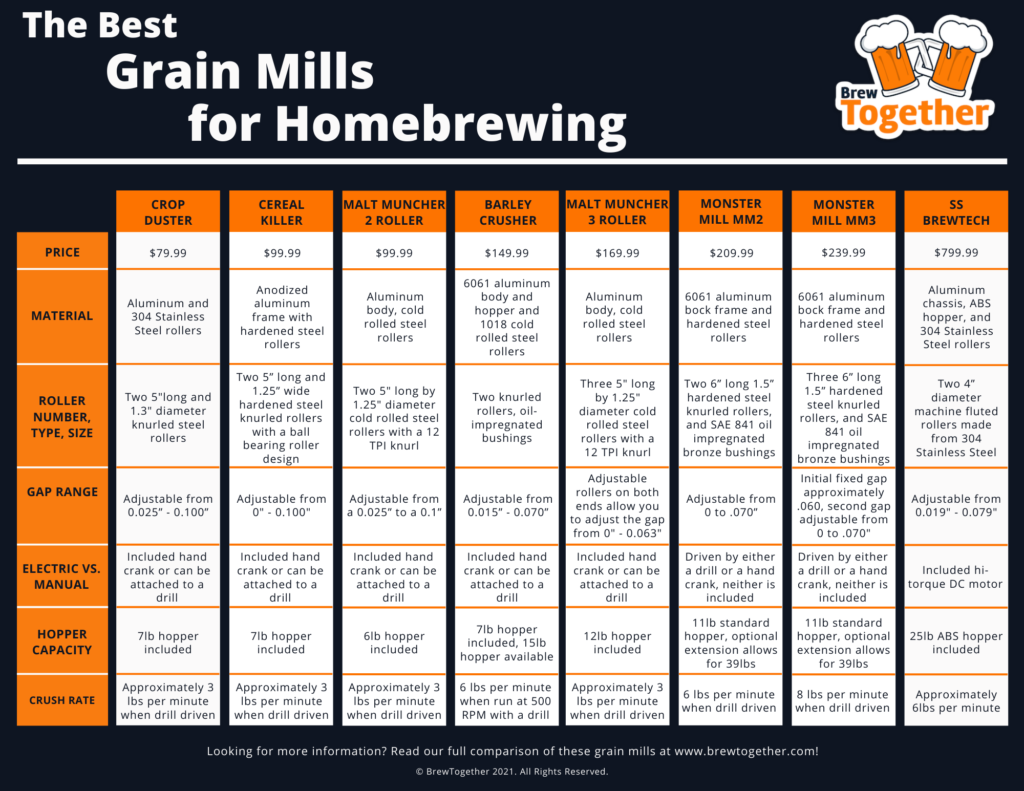

8. Crop Duster (Most Affordable) – $79.99
Coming in at only $79.99, the Crop Duster is the cheapest mill on this list while still maintaining features and quality that make it a worthwhile investment for someone looking for an inexpensive, entry-level mill. It features two SS304 knurled rollers (which are not as hard as the case-hardened rollers in the Cereal Killer) that are adjustable from 0.025” – 0.100”.
One roller is driven by an included hand crank or a drill, while the other is free spinning. Rather than sitting on a base, the Crop Duster sits on a set of support bars, so dust from milling will be a bigger problem with the Crop Duster than models that include a base. While this certainly isn’t the best mill on this list, it is a good mill for the price.
7. Cereal Killer – $99.99
Coming in at only $99.99 when on sale at Adventures in Homebrewing, the Cereal Killer is one of the most affordable grain mills available to homebrewers. Despite its low price, this mill is built from an anodized aluminum frame and features 5” long and 1.25” wide hardened steel knurled rollers. The Cereal Killer comes with a hand crank, but it is easy to remove the hand crank and attach a drill with no adapter needed.
If using a drill it is recommended to not exceed 300RPM, so the recommended crush rate is slower than the Barley Crusher but still fast enough to crush enough grain for an average homebrew in a few minutes. Users that have owned both a Barley Crusher and Cereal Killer have reported that the rollers last longer on the Cereal Killer, making this a great mill for only $99.99.
6. Malt Muncher 2 Roller Grain Mill – $99.99
The Malt Muncher 2 Roller Grain Mill is another inexpensive option for someone looking for an entry-level mill at a low price. Coming in at $99.99, the Malt Muncher 2 Roller Grain Mill features an aluminum body with two 5″ long by 1.25″ diameter cold rolled steel rollers with a 12 TPI knurl. The rollers are adjustable from a 0.025” to a 0.1” gap.
It includes a 6lb hopper and a crank handle, though the 10mm crank shaft works great with a drill running at 200 RPM. This mill does not come with an included base, but a compatible base board is available for $18.99. If you want to upgrade this mill, there is an optional Malt Muncher Grain Mill High Torque Motor available for $199.99 that is made specifically to work with either the 2 Roller and 3 Roller Malt Muncher.
5. The Barley Crusher – $149.99
The Barley Crusher is one of the older and more well-established grain mills marketed to homebrewers. At $149.99, it’s a reasonably priced 2-roller mill that still features a solid 6061 aluminum body and hopper and 1018 cold rolled steel knurled rollers that ride on oil-impregnated bronze bushings. The gap can be set anywhere from 0.015” to 0.070”, which allows for a solid range of crush that should cover most if not all homebrewer needs.
The Barley Crusher can be used with the included hand crank with a drill, providing a crush rate of 6 lbs per minute when run at 500 RPM. The Barley Crusher also comes with an included solid base that allows it to sit securely on a 5 or 6 gallon bucket, making it one of the most affordable complete options while still being a high-quality mill. Users have complained that the roller knurling wears down faster than some other mills because it uses a softer steel than some of the other models on this list.
4. Malt Muncher 3 Roller Grain Mill – $169.99
The Malt Muncher 3 Roller Grain Mill is a substantial upgrade from the 2-roller version, but only costs $169.99. This mill features an aluminum body with three 5″ long by 1.25″ diameter cold rolled steel rollers with a 12 TPI knurl. Adjustable rollers on both ends allow you to adjust the gap from 0″ – 0.063″.
Overall reviews are excellent for this mill, but users have noted that it is difficult to adjust the rollers. The Malt Muncher 3 Roller Grain Mill includes a 12lb hopper and a crank handle, though the 12mm crank shaft works with a drill running at 200 RPM.
If you want to upgrade this mill, there is an optional Malt Muncher Grain Mill High Torque Motor available for $199.99 that is made specifically to work with either the 2 Roller and 3 Roller Malt Muncher. This mill does not come with an included base, but a compatible base board is available for $18.99.
3. Monster Mill MM2 – $209.99
Monster Mills are considered to be some of the highest-quality mills available to homebrewers. They have a solidly-built design consisting of a 6061 aluminum bock frame, two 6” long 1.5” hardened steel rollers, and SAE 841 oil impregnated bronze bushings.
Rather than being screwed together like cheaper rollers, the drive shaft and axles are integrated into the rollers themselves. One roller is gear driven and the other is free-spinning. The Monster Mill MM2 is driven by either a drill or a hand crank, but neither is included. The stainless steel adjustment knobs allow for a gap adjustment range from 0 to .070” and feature a grooved design that prevents gap changes while milling.
If you’re looking for a high-quality 2-roller mill that doesn’t break the bank, the Monster Mill MM2 is a great choice.
2. Monster Mill MM3 – $239.99
Like the Monster Mill MM-2, the Monster Mill MM-3 is an exceptionally high-quality mill that features a solidly-built design consisting of a 6061 aluminum bock frame, but adds an extra roller for a total of three 6” long 1.5” hardened steel rollers, and SAE 841 oil impregnated bronze bushings.
The MM-3’s three roller design feeds grain through an initial fixed gap (approximately .060”) before feeding the grain through a second adjustable gap that crushes the grist. Like the MM-2, only one roller is driven either by a drill or a hand crank (not included).
If you’re looking for a high-quality 3-roller mill at a reasonable price, the MM-3 is a great choice.
1. Ss Brewtech Grain Mill (Best Overall Mill) – $799.00
Unsurprisingly, the Ss Brewtech Grain Mill is the best one on this list, and probably the overall best grain mill available to homebrewers. At $799.00, this mill is obviously not a realistic choice for the average homebrewer, but if you can afford it, you won’t find a better mill. The Ss Brewtech Grain Mill features 4” diameter machine fluted rollers made from 304 Stainless Steel, which provide a more consistent and precise crush, with an adjustment range of 0.5mm to 2.0mm, allowing for a wide range of malts that can be milled.
The aluminum chassis and massive 25lb capacity ABS hopper are beautifully designed, which gives this mill a sleek look that is more visually appealing than any other mill on the market. Because of its large hopper and ability to crush a lot of grain quickly (350 lbs per hour), this mill is a practical choice for small craft breweries as well as advanced homebrewers. While it is out of the price range of the average homebrewer, this is easily the best grain mill on the market and no list would be complete without it.
Thanks for Reading!
We hoped this helped you in your research! Leave a comment below if you have an experience with one of these mills, or if you think we missed a good one! Still have questions? The BrewTogether Forums are a great place to ask!
Thank you for reading! If you like this article, it would mean the world to us if you would share it with your friends using the social media share buttons below.
If you’re not a member of BrewTogether, we’d love for you to join! BrewTogether is completely free, and signing up is easy! Click here to join!



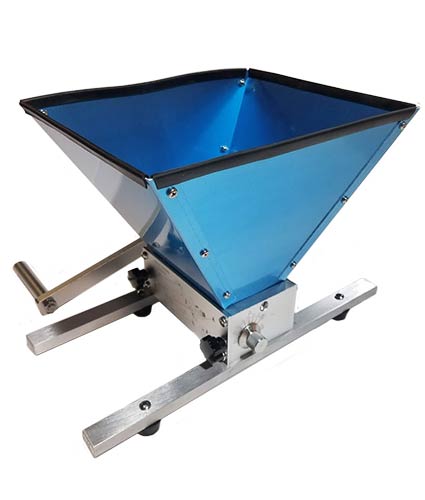
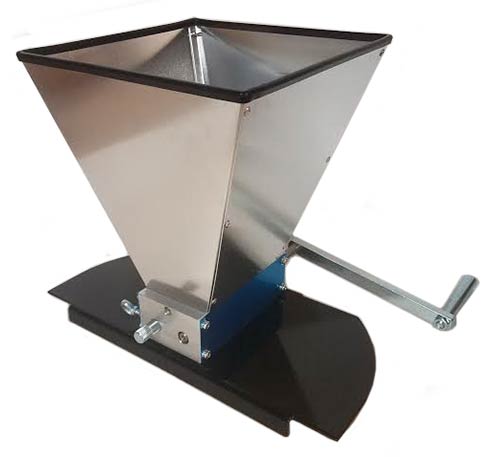
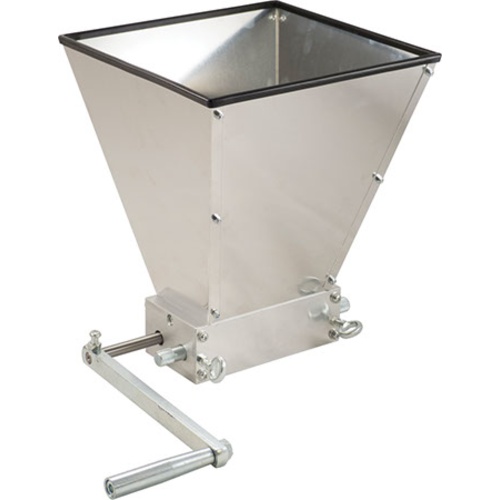



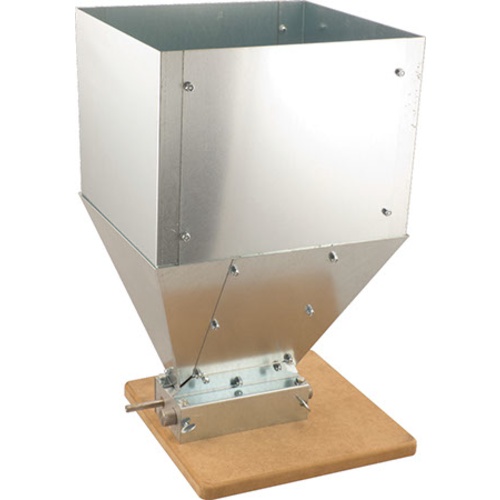
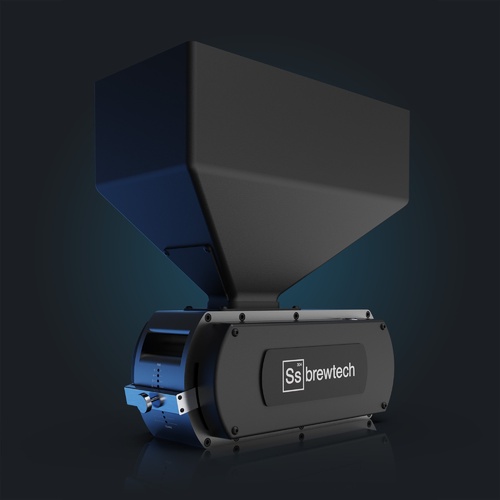
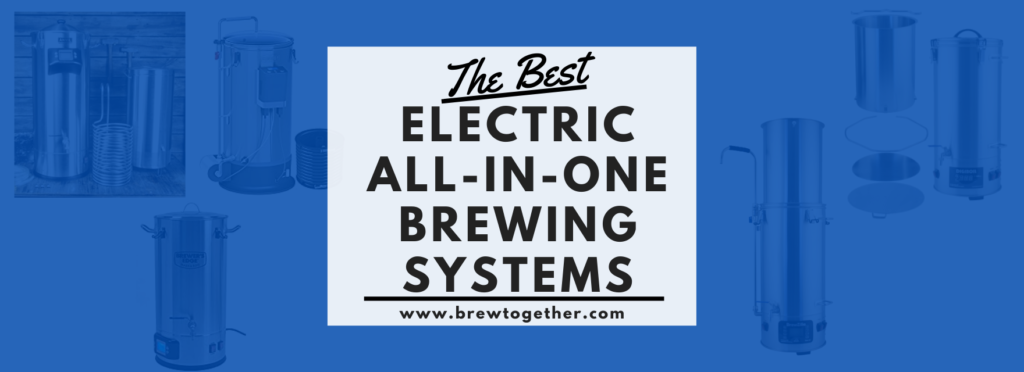
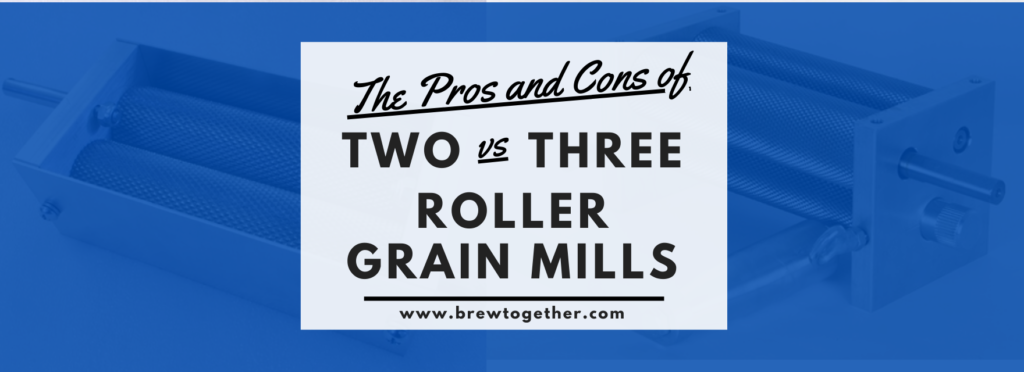



I bought the Cereal Killer recently and have used it once and it worked beautifully with my power drill. I brew 5-6G batches several times a year so I am not brewing 10-15 gallons 2+ times a month with a need for a more expensive 3 roller unit. Frankly, I found this one to be the easy choice. I don’t see the point in spending less when $100 was reasonable for the quality and I certainly have no need for a $150-$250 grain mill.
Those are great points, Daniel! Thanks for the feedback on the Cereal Killer!